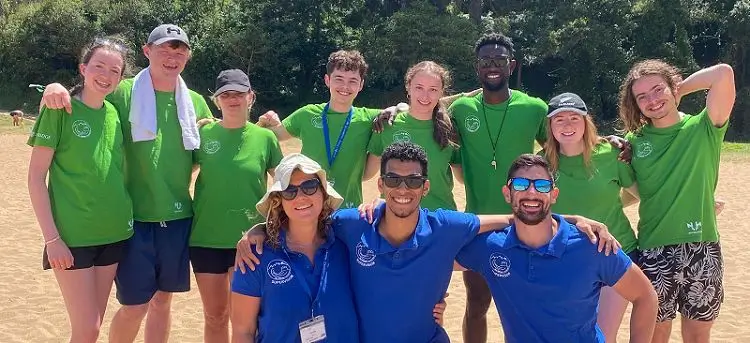The first English camp is usually an exciting experience for both children and parents. However, it also raises understandable questions: Will they be ready to sleep away from home? Will they make friends? Will they enjoy it or want to come back the next day? These are common questions for families facing this stage for the first time.
The good news is that, with the right preparation and by choosing the right camp, the first experience can become an unforgettable memory. In places like The Village, with programs tailored to each age and a safe, international environment, children find the ideal support to take this step with excitement and confidence.
How to know if your child is ready for their first camp
Deciding to send a child to their first English camp does not depend solely on age. What really matters is assessing their level of maturity and emotional readiness. Recognizing these signs will help parents make a more confident decision and prepare the child in the best possible way.
1. Autonomy in daily routines
A camp involves sleeping away from home, following schedules, and taking responsibility for small habits. Therefore, it is recommended that the child can:
- Dress and wash themselves.
- Eat without help and try new foods.
- Organize their basic belongings (clothes, personal items).
- Ask for help if they need something.
These basic skills are not acquired overnight, so it is advisable to start encouraging them weeks before camp.
2. Emotional and social signals
Beyond autonomy, emotional readiness makes the difference. Some positive indicators are:
- Curiosity to explore new environments.
- Ability to separate from parents without excessive anxiety.
- Interest in making friends and sharing group activities.
- Having enjoyed school trips, day camps, or short stays away from home.
On the other hand, if the child shows strong dependence, it may be better to wait or work on the transition with shorter experiences.
3. Communicating needs
A fundamental aspect is that the child can express how they feel: say if they are hungry, cold, scared, or in pain. In international camps, this ability is also reinforced through English, since many needs are expressed directly in the language. That’s why families preparing their child’s first experience often choose a fully immersive English camp in Spain, where children gain confidence using the language in real, everyday situations from day one.
4. Gradual preparation before camp
If it is not clear whether your child is ready, you can take intermediate steps:
- Try a night away at a relative’s or friend’s house.
- Participate in day-long trips or activities.
- Practice group living situations.
These rehearsals help detect possible difficulties before a longer stay.
5. Avoid projecting your own fears
Many parents unintentionally pass on their own insecurities: “I’m going to miss you so much,” “If you don’t want to stay, I’ll call and bring you home.” These phrases create doubts and may predispose the child to feel fear. It is better to convey security, confidence, and enthusiasm for the experience.
6. Age-adapted programs
At The Village, this transition is facilitated with programs designed according to age:
- Kids (8–12 years): close support, guided activities, constant supervision in a 4★ hotel with double rooms and monitors always present.
- Teens (13–17 years): greater independence, sports and creative activities with a more international approach, respecting their need for autonomy in a safe environment.
This division allows each group to enjoy the camp in a way adapted to their maturity, without forcing stages.
Tips to prepare your child before camp
Preparation beforehand is almost as important as the experience itself. The more secure and motivated the child feels, the easier it will be for them to adapt and enjoy camp. Here are some key tips for parents facing their child’s first English camp:
1. Talk with excitement and confidence
Children pick up on their parents’ emotions. If adults transmit fear or insecurity, they are likely to feel the same. It’s better to explain camp as a fun adventure, where they will make friends, discover new activities, and learn English naturally.
Practical tip: instead of saying “I’m going to miss you so much”, use phrases like “You’re going to have a great time and I can’t wait to hear all about it when you come back”.
2. Involve them in packing
Packing together gives them security and independence. Let them choose some personal items (a book, a family photo, their favorite sweatshirt) that remind them of home and make them feel accompanied.
At camps like The Village, children have double rooms in a 4★ hotel with enough space to organize their things. Having their own corner helps them feel more comfortable and responsible for their belongings.
3. Practice English activities at home
A 100% immersion camp in English can be intimidating at first. To reduce that impact, it’s useful to introduce small routines at home: watching a series in the original version, listening to songs, playing with educational apps, or even practicing basic phrases as a family.
At The Village, immersion begins from the very first day, with international coaches and activities designed to help children quickly get used to communicating in English without pressure.
4. Explain the routine so they know what to expect
Children feel calmer when they know what their day will be like. Telling them there will be times for breakfast, sports activities, free time, and rest helps them visualize the experience as something organized and safe.
At The Village, each day combines sports, creative academies, and outdoor activities, always under supervision. Knowing this structure builds confidence and reduces anxiety about the unknown.
5. Train emotional independence
Camp is also an opportunity for children to gain independence. Before going, it’s helpful to encourage them to tackle small challenges on their own: preparing their breakfast, showering at the agreed time, or spending a night at a friend’s house. These previous experiences make adaptation easier.
How to face the most common childhood fears
It’s normal for children to feel doubts or even fear before their first camp. Identifying these fears and addressing them helps them arrive calmer and eager to enjoy. When parents acknowledge and anticipate these emotions, children feel safer and more open to the experience.
Fear of sleeping away from home
For many children, this is the first time they spend several nights away from their parents. They may fear the dark, miss family routines, or simply feel homesick. The important thing is not to minimize the fear, but to teach them that it’s normal and can be overcome. At home, you can practice this transition with small experiences: sleeping at a relative’s or friend’s house, spending a night on a school trip, or rehearsing more independent nighttime routines. Letting the child bring a comfort object —a stuffed animal, a photo, or a favorite book— also helps. The key is to transmit confidence: remind them that at camp there will be attentive adults available at all times. At The Village, participants sleep in double rooms in a 4★ hotel with continuous supervision. Monitors are available 24/7 to meet any need, providing a comfortable, safe environment that makes adaptation easier.
Fear of not making friends
The fear of being alone is one of the most common. Children may worry about not fitting in, not knowing anyone, or feeling excluded. The best way to help from home is to strengthen their self-esteem, remind them what makes them a good friend, practice simple phrases in English to introduce themselves, and explain that most participants are in the same situation. At The Village, the ratio of 1 coach per 5 children allows monitors to provide close support and ensure that all participants integrate into group dynamics from day one. In addition, living with young people from more than 12 nationalities creates an inclusive and multicultural environment where everyone has the chance to connect, learn to relate, and make friendships that often last beyond camp.
Fear of speaking English
Many children feel shy about expressing themselves in a language they don’t master. The fear of making mistakes or not being understood can block them at first. It’s essential to teach them at home that making mistakes is part of learning. Parents can reinforce this idea with simple English games, watching movies or series in the original version, and celebrating every attempt at communication, no matter how small. It’s also important to remind them that communication goes beyond words: gestures, smiles, and positive attitudes help. At The Village, this fear quickly fades thanks to the fact that 80% of coaches are international and English is lived in daily and fun situations. There are no classes or exams; the language is used in sports, excursions, creative workshops, or mealtime. In this way, children discover that English is not a subject to study, but a tool to enjoy and connect.
Fear of the unknown
Beyond sleeping away, making friends, or speaking English, many children feel uncertain about what they don’t know. What they will do each day, what the monitors will be like, where they will sleep, or what they will eat are common questions that generate anxiety. That’s why it’s helpful to explain the daily routine and show them photos or videos of the place. Anticipating details like having breakfast as a group, sports, creative activities, and excursions helps them see the experience as something organized and safe. At The Village, the routine combines sports, themed academies, and free time, always under supervision. This balance between fun and organization creates a predictable framework that reassures children and allows them to enjoy themselves from day one.
Facing these fears with empathy, preparation, and clear examples turns the unknown into an exciting adventure. And when a child feels supported at every step, the camp experience becomes a positive memory that strengthens their independence and self-confidence.
What an English camp should offer so that children enjoy
An English camp should not just be a place to learn a language, but a complete experience that combines fun, social life, and safety. When children feel that they are having fun and that each day brings something new, learning happens naturally. These are the key aspects that a camp should include to ensure your child enjoys it from day one.
Varied and exciting activities
Monotony is the worst enemy in a camp. If days are too similar or activities are limited, children get bored quickly. That’s why variety is essential: sports, excursions, creative workshops, outdoor time, and social moments. The more opportunities they have to explore, discover, and try new things, the more motivated they’ll be. At The Village, each day combines sports such as surfing, sailing, football, or tennis with creative academies like musical theatre, cooking, or audiovisual production. This diversity ensures that every child finds activities they are passionate about and never feels like they are repeating the same thing.
Natural learning without classes or exams
English should be lived, not imposed. Children enjoy learning more when it happens through games, songs, sports, or projects. Exams or theoretical lessons can cause rejection, especially in those expecting a summer different from school. That’s why the ideal camp offers total immersion in the language through real experiences. At The Village, English is present 15 hours a day in all activities, but without traditional classes or assessments. The supervision of Cambridge University Press & Assessment guarantees educational quality, while the methodology turns English into a tool for spontaneous communication.
Monitors attentive also to the emotional
Enjoyment depends not only on the activities, but also on how children feel during the experience. A good camp takes care of the emotional aspect, fostering integration and helping each child feel part of the group. This is achieved with close monitors, small ratios, and personalized follow-up. At The Village, the ratio is one coach for every five participants, which ensures individualized attention. In addition, the international team of coaches brings not only language knowledge but also closeness and educational vocation so that each child enjoys with confidence.
Multicultural coexistence that enriches the experience
One of the greatest attractions of an English camp is the opportunity to live with people from other cultures. This interaction makes English the common language and reinforces the motivation to communicate. It also opens children’s and teens’ minds to different realities, broadening their view of the world. At The Village, young people from more than 12 nationalities and from 36 Spanish provinces participate, creating a unique international environment within Spain. This environment allows children to learn English in a real and fun context, while making friends from all over the world.
A camp that meets these conditions not only ensures fun, but also turns learning English into a natural, positive, and memorable experience. This is how the first experience becomes an unforgettable summer that children want to repeat year after year.
Checklist for parents before the first camp
One of the biggest sources of reassurance for parents is knowing they have chosen well. Making a short checklist helps review the key aspects before sending a child to their first English camp. These are the essential points you should check:
- Safety and accreditations: Does the camp have official licenses, emergency protocols, and insurance included? At The Village, every participant is covered with accident, assistance, and liability insurance.
- Monitor-to-child ratio: Will there be close supervision? The recommended standard is one monitor for every 8–10 children, but at The Village the ratio is 1 coach for every 5 participants, which ensures individualized attention.
- Training and background of monitors: Are they native or qualified bilinguals? At The Village, 80% of the coaches are international, which guarantees real and constant immersion in English.
- Facilities and environment: Check where they will sleep, eat, and do activities. At The Village, children stay in a 4★ hotel and enjoy a sports campus with swimming pools, courts, and a theatre in a safe natural setting in Asturias.
- Food and adapted menus: Confirm that there are options for allergies, intolerances, and special diets. At The Village, meals are supervised by nutritionists and menus are adapted according to each child’s needs.
- Activity program: Make sure it combines sports, culture, creativity, and free time. Variety is key to avoiding boredom and encouraging natural learning.
- Real English immersion: Ask what percentage of the day is conducted in English and how the language is integrated. At The Village, children have over 200 hours of English in two weeks, without classes or exams, only through experiences.
- Communication with families: Find out how you’ll receive updates about your child during camp. At The Village, there is constant supervision and the family care team maintains direct contact if needed.
Reviewing this checklist before booking ensures that the chosen camp meets the necessary standards so that your child’s first English camp is a positive, safe, and enriching experience.
How to choose the ideal camp for a positive first experience
The first camp marks a turning point in a child’s life. If the experience is positive, they’ll want to repeat it every summer and will face new stages with confidence. If, on the other hand, they feel insecure or bored, they may associate camps with something negative. That’s why choosing well is not only a logistical decision, but an investment in memories and learning that will last a lifetime.
An ideal camp for a first experience must meet three requirements: total safety, natural learning, and guaranteed fun. The combination of these three factors makes it easier for children to adapt, feel comfortable from the first day, and return home with more independence, new friends, and improved English.
At The Village, everything is designed to make the first time unforgettable. Separate programs for Kids (8–12) and Teens (13–17) ensure that each child has an experience adapted to their age and maturity. The close ratio of 1 coach for every 5 participants guarantees constant support, while total immersion with international coaches makes English part of daily life. In addition, premium facilities —4★ hotel and sports campus— and the natural setting of Asturias provide a safe and inspiring environment where each day combines sports, creativity, and multicultural coexistence.
If you are looking for a camp that gives you the peace of mind of knowing your child is well cared for, while also offering them a summer full of fun, learning, and confidence, The Village is the best choice.




